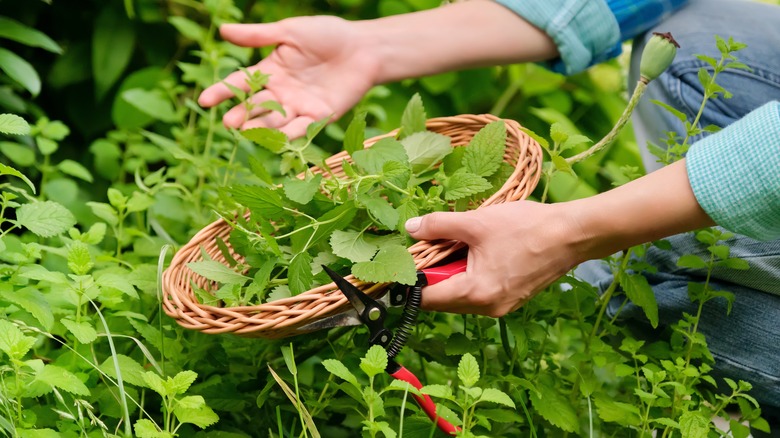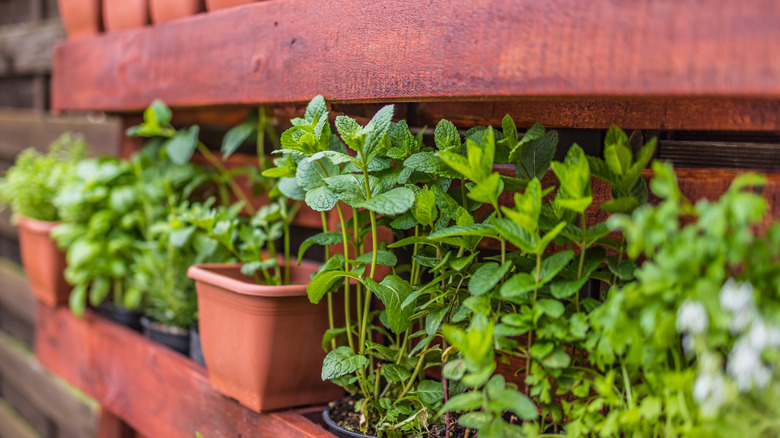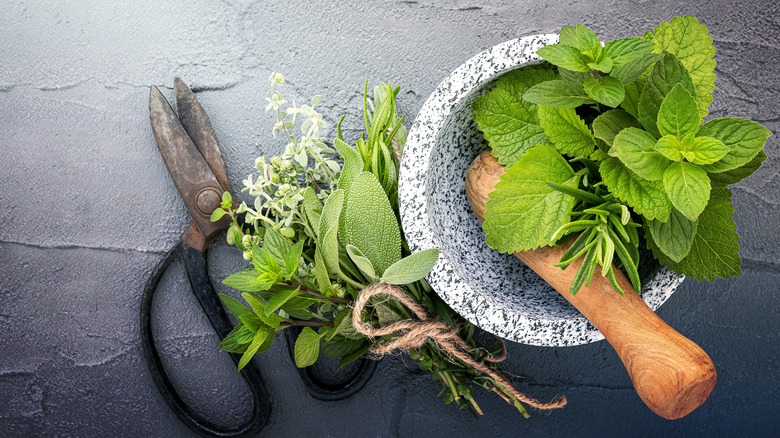The Citrusy Plant You Should Grow To Keep Spiders Out
We all know the wonders of citrus. Delectable in just about any food, amazing for creating wonderful aromas in your home, and beautiful in a thriving garden. But as you're growing your garden, pests can go to town on your wonderful seedlings and leave them bitten up, or worse, dead. Luckily, it turns out there is a lesser-known citrus plant that could keep spiders far away from your home. Lemon balm, a delightfully strong plant known for its refreshing appeal, is the key to keeping spiders out of your garden.
This works because lemon balm has two central compounds that are great for keeping pests away: citronellol and geraniol. Appearing as a clear liquid with a naturally bitter taste, citronellol is present in many of our favorite plants like roses and lemongrass. Geraniol is a natural antioxidant that appears in many vegetables and natural herbs like lavender.
For humans, these two components are extremely non-toxic, but they are naturally irritating to spiders. Because of their sensitive olfactory systems, the smell is off-putting and will quickly make eight-legged visitors avoid any area or garden that reeks of these two compounds.
How to grow lemon balm
This plant thrives with ease in the spring and summer seasons because it desires lots of sun. Start by using a base of well-draining fertile soil. Feel free to germinate your seeds. Once your seedlings are planted, lemon balm can grow quite aggressively in large clumps, so propagating your plant is a great idea if you want to spread out your new spider security.
The key to understanding how to grow and care for lemon balm is that it usually has a lifespan of about 3-4 years, and it's best to replace the plant periodically. Be wary of possible diseases, too. When overwatered, root rot and powdery mildew may appear. Be sure to separate these pots, if inside, and regularly cut back affected area if your lemon balm resides in your outdoor garden. Spraying the leaves with a baking soda and water mixture can help any infected areas. Other than that, this plant is fairly strong and grows easily. It generally isn't a target for pests, considering its smell tends to keep away any lurking critters.
If you have plenty of plants indoors, spread your lemon balm plants to different entryways in your home like your front and back doors and windows.If you've seen spiders in particular areas before, crush a few leaves nearby to release the smell of lemon balm. They'll surely stray if they decide to visit those areas again.
Other uses for lemon balm around your home
Now that you've found your new favorite citrus plant, there are so many ways to use it, beyond keeping pests away. Lemon balm soothes bug bites and keeps mosquitos away because it acts as an anti-inflammatory and anti-bacterial agent that naturally reduces any redness or swelling. It also contains polyphenols and tannin, astringents that help relieve infections and speed up the healing process. Apply it topically in the form of a cream or salve for ideal results. Lemon balm can attract bees to your garden. As they're a major part of our ecosystem and aid the constant production of plant life, it's a good bug attractor because it produces chemicals similar to bee pheromones.
It's also great as the base of any DIY home cleaner. All you need is a fistful of lemon balm, white vinegar, water, a spray bottle, and a jar or mug. Letting your lemon balm sit in the sun for a few hours is key. Mix your vinegar and lemon balm and let sit until you feel both have marinated long enough to infuse. After, strain your mixture and add what's left to a bottle containing one parts water and two parts vinegar. Shake well, and it'll be ideal for cleaning any surface. Don't store your mixture in a plastic bottle, especially if you opt for lemon balm essential instead of the actual plant, as this can cause the plastic to degrade. Use a glass bottle instead.



